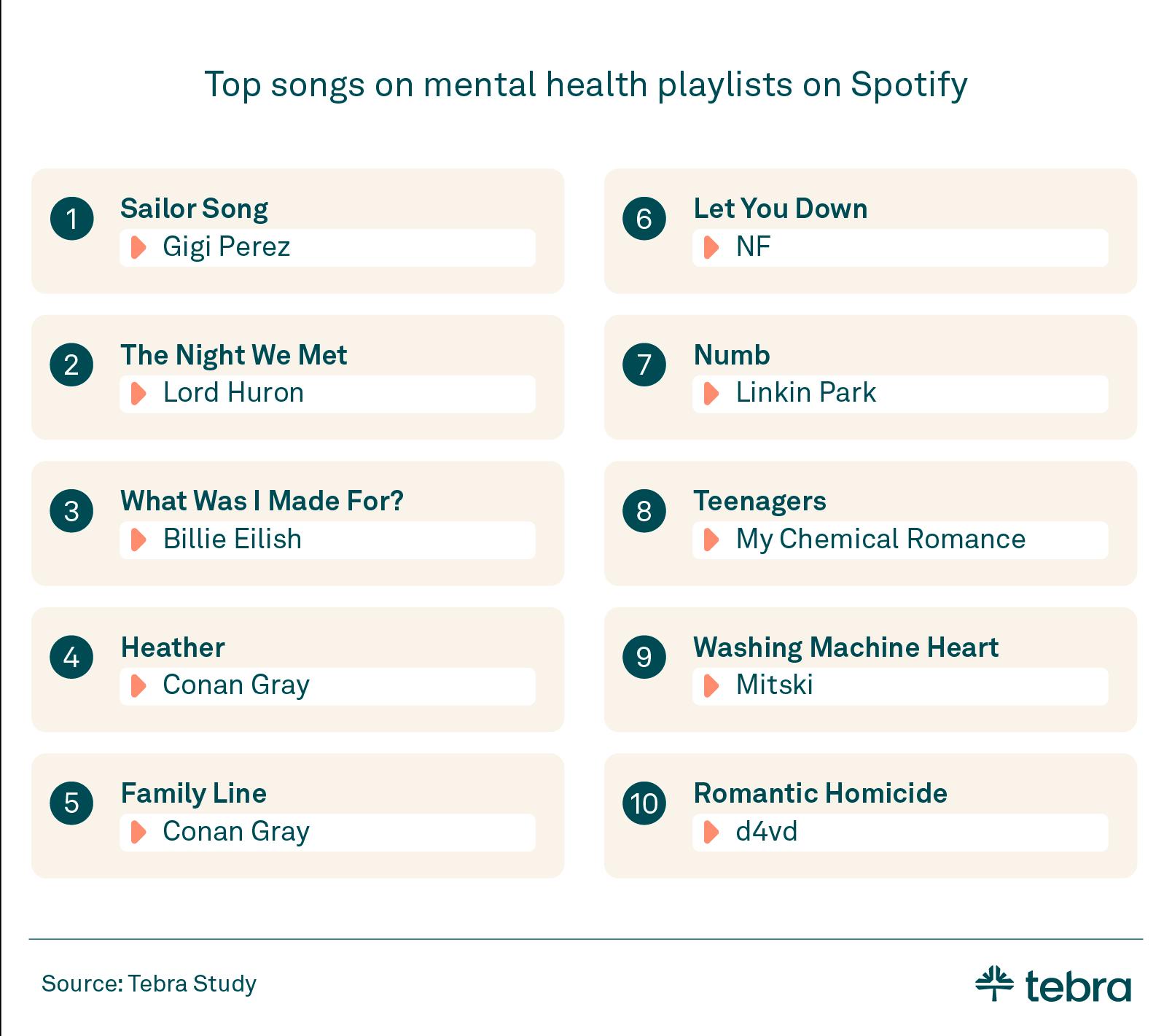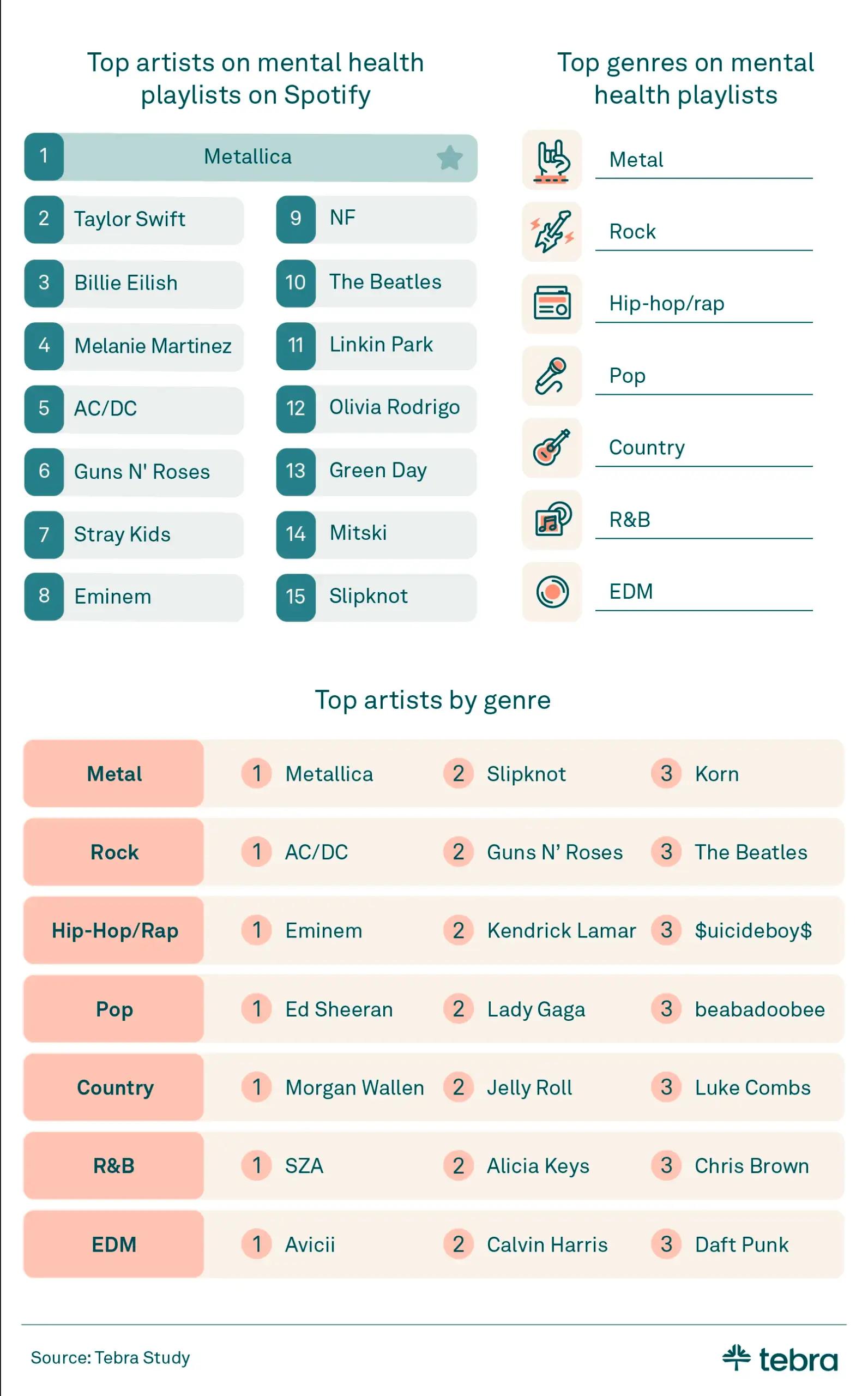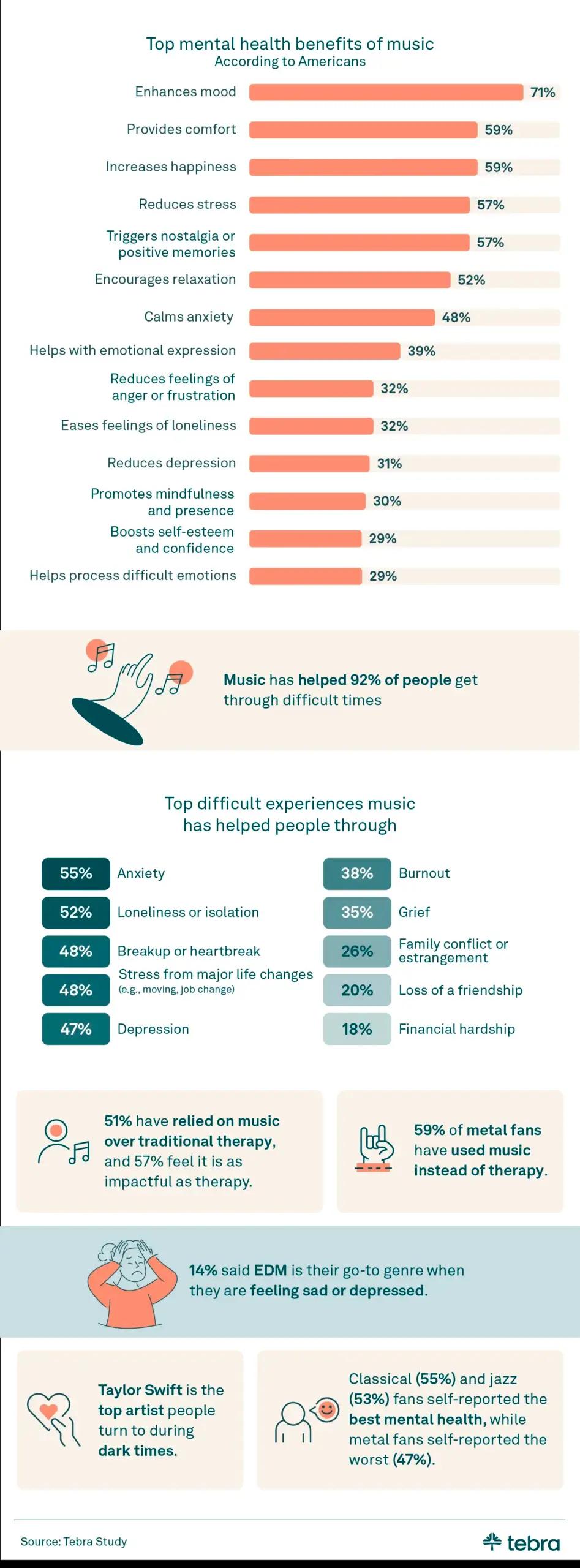The mental health playlist: What songs help patients through tough times?
Discover which songs, artists, and genres patients turn to most when they’re struggling.

Music has long served as an emotional outlet, helping listeners to process pain, find comfort, or feel understood — much like the growing role of digital tools in supporting emotional wellness and patient-centered care in healthcare settings. But just how powerful is it when it comes to supporting mental health?
To explore this question, Tebra surveyed 1,000 Americans and analyzed over 110,000 tracks from public Spotify playlists labeled "mental health." The results reveal which songs, artists, and genres people turn to most when they're struggling and how music helps them cope.
Key takeaways
- Metal is the most common genre on Spotify's mental health playlists, and Metallica is the top artist.
- 92% of Americans say music has helped them through tough times, especially anxiety (55%), loneliness (52%), and depression (47%) - areas where compassionate care and emotional support patient experiences also play a critical role
- 51% have used music instead of traditional therapy, and 57% say it's just as impactful.
- 14% say EDM is their go-to genre when feeling depressed.
Most comforting songs for mental health struggles
Music can provide solace, reflection, and release during difficult emotional moments. To better understand which songs resonate most during mental health challenges, we analyzed the top recurring tracks from Spotify playlists dedicated to mental well-being.

The most frequently appearing song across over 110,000 Spotify tracks tagged for mental health was "Sailor Song" by Gigi Perez. With its raw vulnerability and introspective lyrics, it stood out as a top choice for those seeking comfort through sound.
Other frequently featured songs included "The Night We Met" by Lord Huron and "What Was I Made For?" by Billie Eilish, both known for their haunting tones and emotional depth. Conan Gray made a double appearance among the top 5 songs with "Heather" and "Family Line."
Additional favorites such as "Let You Down" by NF, "Numb" by Linkin Park, "Teenagers" by My Chemical Romance, "Washing Machine Heart" by Mitski, and "Romantic Homicide" by d4vd also surfaced repeatedly. Mental health playlists have a strong lean toward emotionally charged, lyrically honest music.
Most popular artists and genres for mental health support
When emotions run high, many turn to specific artists or genres that speak to their experiences. Next, we uncover which are most commonly chosen to process emotional struggles.

Listeners are finding mental health support through a wide range of musical styles and voices. Metal emerged as the most dominant genre on mental health playlists, with Metallica taking the top spot as the most featured artist overall. Slipknot and Korn also ranked highly within the metal category.
Among the top artists overall, Taylor Swift ranked second, while Billie Eilish came in third. Other genre leaders included country's Morgan Wallen, Jelly Roll, and Luke Combs, as well as Avicii, Calvin Harris, and Daft Punk in EDM.
How people use music to manage mental health
Beyond playlists, Tebra surveyed 1,000 Americans to understand how they use music in their daily lives to cope with mental health challenges — a reminder that everyday emotional tools often work in tandem with the in-office care experience, from check-in to follow-up.

Just over half of the respondents (51%) said they had turned to music instead of traditional therapy, and 57% believed it was just as impactful — a reminder that emotional support can come from multiple sources, including enhanced patient communication in healthcare settings. That connection was even more pronounced among metal fans, as 59% reported using music as a therapeutic substitute. However, this same group had the highest rate of poor mental health at 47%.
Fans of classical and jazz reported the best mental health, with 55% and 53% describing their mental state as good. EDM also emerged as a coping tool, with more than 1 in 10 Americans (14%) naming it their go-to genre when feeling down — highlighting opportunities for streamlining emtional care workflows in clinical and everyday settings alike.
Across all genres and preferences, 92% of people said music helped them through difficult experiences, most often with anxiety (55%), loneliness (52%), heartbreak (48%), and stress from major life changes (48%) — underscoring the importance of supporting patients beyond the exam room.
Music's powerful role
Music is a meaningful part of how many people manage their mental health. It helps them feel understood, less alone, and more in control of their emotions — feelings that thoughtful healthcare design and patient-first workflows can reinforce in clinical environments. For healthcare providers, these insights offer another way to understand patient needs and open the door to more compassionate conversations about care — especially as technology-enabled care becomes more central to the patient experience. As mental health remains a priority, so does the value of meeting patients where they are, whether through clinical treatment or by acknowledging the everyday tools they use to feel better.
Methodology
To explore music trends related to mental health, we analyzed a dataset of over 110,000 tracks sourced from public Spotify playlists under "mental health." Each track entry included song name, artist(s), genre tags, and associated playlist metadata. We cleaned and standardized the data by removing identical entries and consolidating genre labels into broader categories (e.g., mapping "nu metal" and "industrial metal" to "metal"). We then identified the most frequently appearing songs and artists and ranked the top artists within each genre. This methodology provides insights into how listeners and playlist curators use music to express or address mental health themes. We also surveyed 1,000 Americans on March 20, 2025, to explore how people use music for their mental health.
About Tebra
Tebra, headquartered in Southern California, empowers independent healthcare practices with cutting-edge AI and automation to drive growth, streamline care, and boost efficiency. Our all-in-one EHR and billing platform delivers everything you need to attract and engage your patients, including online scheduling, reputation management, and digital communications.
Inspired by "vertebrae," our name embodies our mission to be the backbone of healthcare success. With over 165,000 providers and 190 million patient records, Tebra is redefining healthcare through innovation and a commitment to customer success. We're not just optimizing operations — we're ensuring private practices thrive.
Fair use statement
These findings may resonate with music lovers and mental health advocates alike. Please share responsibly and link back to this page when you do.
- Current Version – Jul 17, 2025Written by: Jean LeeChanges: This article was updated to include the most relevant and up-to-date information available.
- May 12, 2025Written by: Jean LeeChanges: This article was updated to include the most relevant and up-to-date information available.





